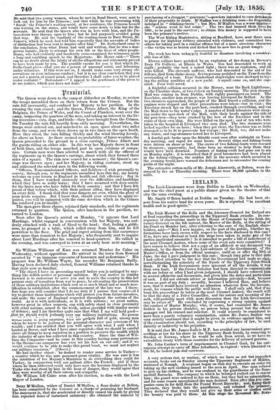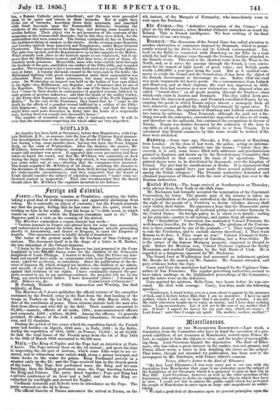IRELAND. •
The Lora-Lieutenant went from Dublin to Limerick on Wednesday, and was the chief guest at a public dinner given in the theatre of that city the same evening. • Mr. Smith O'Brien landed at Dublin on Tuesday. He had been ab- sent from his native land for seven years. He is reported "in excellent health and in good spirits."
The Irish Master of the Rolls and the Attorney-General for Ireland are at feud regarding the proceedings in the Tipperary Bank swindle. In con- sequence of observations made in the House of Commons by the Irish At- torney-General on the 4th instant, the Master of the Rolls, at the sitting of his Court on Monday last, after referring to the ease of the English share- holders, said—" May I now inquire, on the part of the public, whether in formations have been sworn with respect to the facts disclosed in this case ? If so, have any effectual or bona fide steps been taken to make nny o the parties implicated amenable? Is it intended to prefer ,a bill ef indictment at the next Clonmel Assizes' where some of the overt acts were committed ? I have reason to believe that not a copy of an affidavit or any doctunent wag obtained, by the direction of the Law-advisers of the Government, of 'the Master's Office, or from the official manager, until on or after the 20th of June, the day I gave judgment in this case • though long prior to that date I had called attention to the fact that the 'Government had made no sign, notwithstanding the notoriety of the frauds of the Tipperary Joint-Stock Bank. If the Irish Government were ignorant of all the details, it was their own fault. If the .Crown Solicitor had been directed to communicate with me before or after I had given judgment, I should have referred him to several affidavits and documents, and given him the dates and particulars of each. I did not obtrude advice or information privately—first, because it was no part of my duty ; secondly, because I believed then, and believe now, that it would have received no attention whatever from the Govern- ment for reasons which the public well know. I shall only add, that if no bona :fide proceedings be taken at the next Clonmel Assizes, the result will be that the duty of a Privy Councillor, and the nature and meaning of the oath, will probably meet with more discussion than the Irish Government may be aware of." He concluded by expressing a strong opinion against the conduct of Master Murphy, who, it seems, bad examined Mr. Jennie. Sadleir in his private chamber, no person being present but the official manager and his counsel and solicitor. It could scarcely be considered to have been a purely voluntary- examination, unless Mr. lames Sadleir was very strictly: cautioned that it might be given in evidence against him, and if the examination should not, according to the principles of law, be use& directly or indirectly to his prejudioe.
It is said that Mr. James Sadleir M.P. has avoided any inconvenient pro- ceedings at law for his share in the Tipperary Bank frauds, by removing to Sweden or Norway, where he would be safe from arrest, as we have no extradition treaty with those countries for the delivery of accused persons. Mr. John Carden's term of imprisonment in Clonmel Gaol, for his out- rageous attempt to carry off Miss .Arbuthnot, is expired : when liberated on the 3d, he looked pale and careworn.
A very serious riot, or mutiny, of which we have as yet but imperfect accounts, broke out on Sunday among the Tipperary Regiment of -militia, stationed at Nenagh. A Sergeant began on that day to execute an order for taking up the new clothing issued to the men in April. One man refused to give up his clothes, and he was confined in the guardhouse of the Sumr merhill Barracks. The company to which he belonged rushed out to rescue him ; the guard were ordered to fire on them,. but they had no ammunition, and for some reason unexplained the men desisted. Soon after this five com- panies came in for drill from the Pound Street Barracks ; and fixingtheir bayonets, they broke into the guardhouse, and released the prisoner.- They declared that they would not give up their arms or clothes until the 'bounty was paid to them. At this stage the Reverend Mr. Scan- lan, a Roman Catholic priest, interfered ; and the men were prevailed upon to be quiet and return to their barracks. But at night they broke out of barracks, knoching down their sergeants, and marched with fixed bayonets upon the Summerhill Barracks, breaking the windows of the police-station by the way, and serving some houses in a similar fashion. 'Their object was to get possession of the contents of the magazine at the Summerhill Barracks ; but in this they were foiled, for the mnmunition had been removed. The rioting continued all day on Tuesday, the mutineers firing at random in the streets. In the evening some Regulars and Cavalry arrived from Limerick and Templemore, under Major-General Chatterton. They marched to the SummerhiII Barracks, with loaded pieces. The gate was opened, and the Regulars drew up in line opposite to the Militia. What actually took place in the barrack square is not explained; but it ap- pears that the Militiamen resisted, and that they were, or part of them, ul- timately made prisoners. Meanwhile, some who were outside fired through the keyhole of the gate, and killed one soldier of the Fifty-fifth, and wounded another. The troops seem to have been sent forth next day to quell the Militia- men at large. A regular skirmish ensued in the town and in the fields ; the Militiamen fighting with great determination until their ammunition was exhausted. Many were taken prisoners, but many escaped with their arms. On Wednesday an inquest was held on the bodies of four men killed in the fight—two Militiamen, one Regular, and a Pensioner shot by one of the Regulars. The Coroner's Jury, in the case of the three first, found that they "came by their deaths in consequence of gunshot wounds inflicted by some person or persons unknown ; and that the death of the soldier Curley, of the Forty-first Regiment, was caused by a soldier of the North Tipperary Af.ffitia." In the case of the Pensioner, they found that he "came to lus death by the effects of a gunshot wound inflicted by a soldier of the Fifty- fifth Regiment ; that such firing was unjustifiable; and that the troops might have used more discretion in firing into the house of a respectable man, having fired ten rounds into deceased's house."
The number of wounded on either side is variously stated. It will be seen that the statements respecting the whole affair are very imperfect.



























 Previous page
Previous page